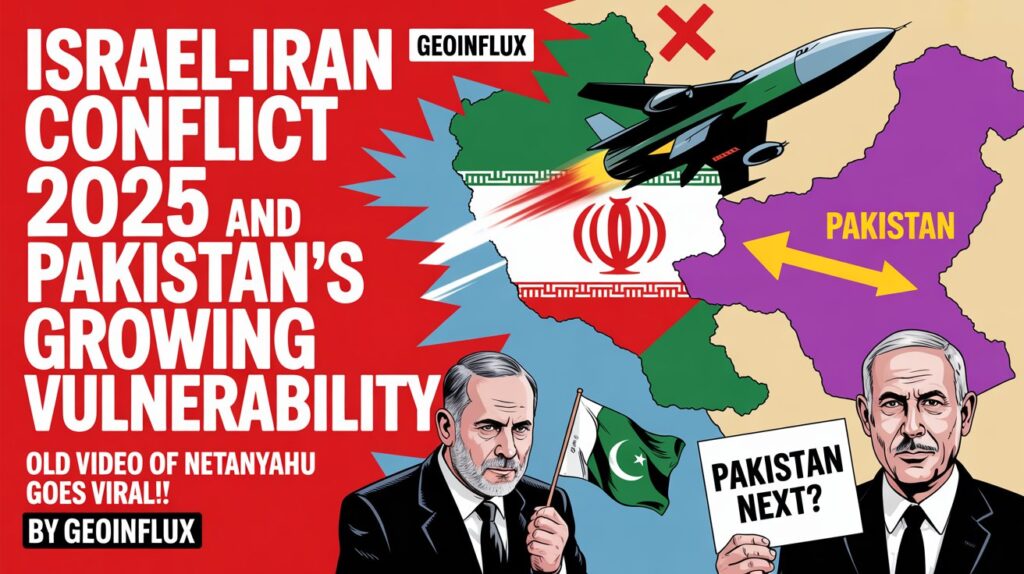The current Israel-Iran conflict 2025 has sent seismic waves through global geopolitics. As the battle intensifies, Pakistan’s national security concerns are rising sharply — with renewed attention drawn to a viral Netanyahu video that explicitly named Pakistan as a future security challenge for Israel.
This post explores the Israel-Iran tensions, Pakistan’s fear of being the next target, and the regional ramifications for India, the U.S., and the Muslim world — through the lens of recent events and historical geopolitical strategies.
Israel-Iran Conflict 2025: A Dangerous Escalation
Reports confirm that Israel and Iran are actively engaged in a multi-day military confrontation, focusing on targeting each other’s oil and military infrastructure. A massive explosion at a Tehran oil depot drew global headlines like “Tehran is Burning”, while Iran retaliated by striking Israel’s Haifa terminal — a site linked to India’s Adani Group.
Despite this tit-for-tat, Israel appears to maintain strategic superiority, having successfully destroyed key Iranian defense installations and allegedly assassinated multiple nuclear scientists. This reflects Israel’s intelligence capabilities and military readiness in the region.
Pakistan’s Fear of Becoming the Next Target amid Israel-Iran Conflict 2025
The fallout of the Middle East conflict has caused unrest in Pakistan’s political and defense circles. With historical tensions, nuclear capability, and regional instability, Pakistan fears that it may follow Iran as the next Israeli target.
Key Pakistani Political Responses:
- Khawaja Asif, Defense Minister, warned that the Muslim world must unite or face destruction “one by one.”
- Asad Qaiser, senior politician, warned in Parliament: “God forbid, after Iran, it is not our turn.”
Both cited past instances where Israeli drones were used by India, raising suspicions of growing cooperation between India and Israel in regional conflicts.
Viral Netanyahu Video Sparks Debate in Pakistan
The resurgence of a 10–15-year-old video of Israeli PM Benjamin Netanyahu has heightened Pakistan’s anxieties. In the interview, he names “Iran and Pakistan” as the two greatest threats to global security if they fall under militant Islamic regimes with nuclear weapons.
This has revived discussions around:
- Taliban takeover of Pakistan
- Nuclear non-proliferation in South Asia
- Israel’s long-standing threat perception
Many believe that this “old warning” has renewed relevance amid today’s regional chaos.
U.S.-Pakistan Relations: Dependency and Control
Pakistan’s dependence on the United States plays a crucial role in shaping its geopolitical posture. The following key factors highlight how deeply embedded U.S. influence is in Pakistan’s military and political systems:
Highlights:
- Imran Khan’s arrest after anti-U.S. remarks shows political vulnerability.
- Annual U.S. support of \$400 million for F-16 maintenance sustains Pakistan’s air capabilities.
- Reliance on IMF, World Bank, and ADB — institutions aligned with U.S. foreign policy.
Despite anti-American sentiments in Pakistani media, its military and elite leadership remain aligned with Washington due to financial, strategic, and institutional dependencies.
- Pakistan IMF dependency
- Imran Khan anti-US stance
- Pakistan F-16 U.S. control
What Could Trigger an Israeli Attack on Pakistan?
Analysts suggest two key conditions under which Israel may view Pakistan as a direct threat:
- Breakdown of U.S.-Pakistan relations — a shift away from Western control.
- Taliban-style regime change — replicating the Afghan scenario.
In either case, a preemptive Israeli strike cannot be ruled out, particularly with U.S. support in disabling Pakistan’s aerial defenses. Experts believe Pakistan’s elite are actively avoiding such risks to preserve national integrity.
India’s Viewpoint: Strategic Calculations Amid Israel-Iran Conflict 2025
India remains cautiously observant. A destabilized Pakistan could spark:
- Massive refugee inflows
- Terrorist spillovers
- Regional instability impacting India’s national security
India’s concern centers around Pakistan’s long-range missiles, which have the capability to strike deep into Israeli territory, potentially drawing India-Israel cooperation into sharper focus.
Conclusion: Pakistan’s Diplomatic Dilemma Amid Israel-Iran Firestorm
The Israel-Iran war 2025 is not just a Middle Eastern conflict — its tremors are being felt across South Asia, particularly in Pakistan’s national discourse. While the Netanyahu-Pakistan video may not signal immediate conflict, it does underline the long-term strategic risks associated with political instability, nuclear proliferation, and shifting alliances.
For Pakistan, the path forward lies in:
- Maintaining internal political stability
- Ensuring continued U.S. support
- Avoiding a Taliban-style insurgency
- Preventing becoming the next geopolitical flashpoint





Pingback: PM Modi Rejects Trump’s Invitation
Thank you for sharing superb informations. Your web-site is very cool. I’m impressed by the details that you’ve on this blog. It reveals how nicely you understand this subject. Bookmarked this web page, will come back for more articles. You, my friend, ROCK! I found just the info I already searched everywhere and simply couldn’t come across. What a perfect web site.